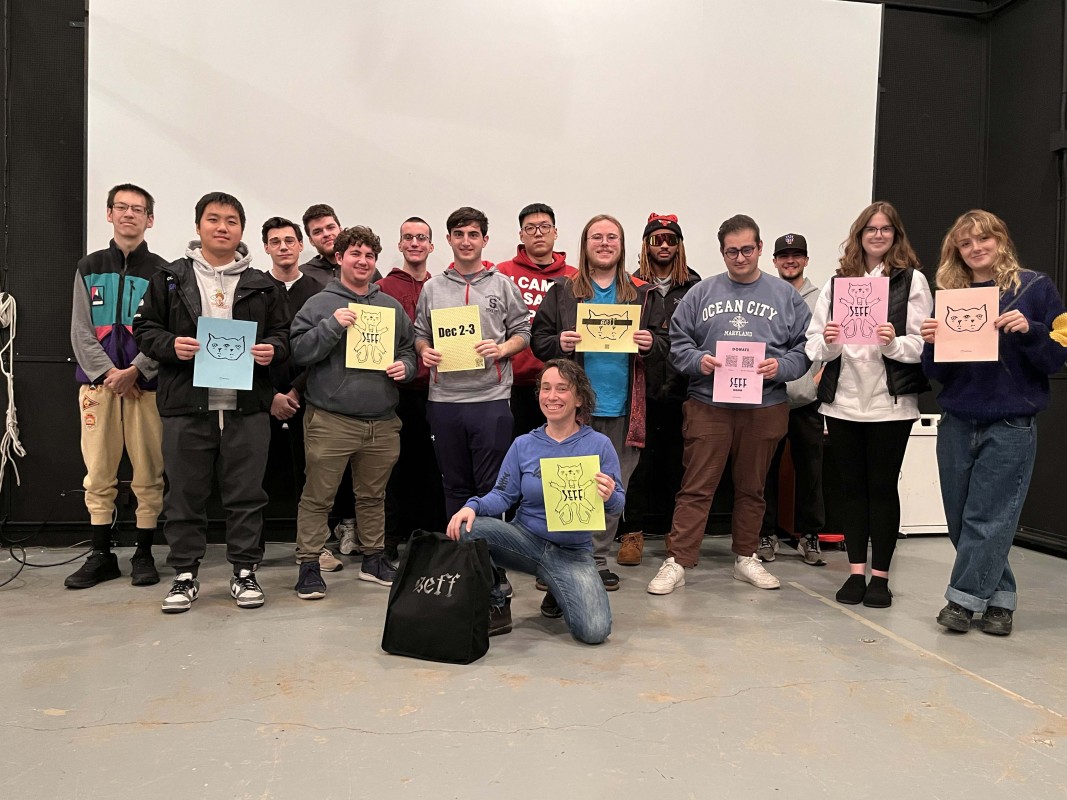At the movies: Class organizes the annual Student Experimental Film Festival
Scheduled for Dec. 2 and 3 in Vestal, the event features student-made films from all over the country

It’s one thing to love film. Watching hundreds of films over a few weeks is an entirely different level of interest.
Students in CINE 300: Curating Film and Video recently did just that, with a specific goal in mind: finding the best student-created films in the country to showcase at Binghamton’s Student Experimental Film Festival on Dec. 2 and 3. This year’s theme is “Dream States.”
Taught by cinema lecturer Anna Kipervaser, the class is entirely focused on envisioning, curating and planning SEFF, honing their event-planning skills. Students in the class work in teams on all aspects of the festival, from fundraising and film curation to graphic design and social media promotion. Many serve on more than one team, said senior cinema major Camilo Gonzalez.
“Everything you need to put on a film festival, essentially,” added senior cinema major Andrew Frangella. “We do it all.”
For senior cinema major Elijah Goldenberg, the class was a happy accident; he was looking for production classes that fit into his schedule and didn’t even read the description before he enrolled.
“On the first day, our professor started explaining what this class is about, and I thought, ‘This is awesome,’” he said. “It’s really exciting to be in a class where the outcome of your work is so tangible. I’m not writing an essay summarizing my experiences; I’m creating something for the larger world.”
The class watched and rated more than 155 submissions from all over the country, ranging in length from 11 seconds to more than an hour.
The lead programmers decided the submission criteria early in the process, Goldenberg said. There were three categories of scoring: relevance to the theme, overall quality and personal enjoyment. Students watched and gave a score to each submission. Scores were then tallied to find the best fit, followed by discussion by the lead programmers. Considering that the entries drew more than 1,000 class responses, the selection process took some time, Frangella said.
In the end, they chose 51 films for six programs across two days: a Saturday night show and a Sunday matinee that focuses on daydreams. The class wants to be able to pay screening fees to the artists, which is why they’re fundraising, they said.
The most challenging part so far: deadlines. The submission deadline was Oct. 24, and the class wanted to make sure that filmmakers would receive notice that their submissions were accepted by the first week of November — which meant buckling down for a marathon viewing session, Gonzalez explained. Class discussions also needed to adhere to a strict schedule to ensure the festival stayed on track.
“The hardest part of the class is the reason it’s so rewarding: Everything we do actually has an impact,” Goldenberg reflected. “If I don’t pay attention, if I don’t do my work, this thing might not happen.”
Seeing such a large number of films also inspired the class on the filmmaking front, students said. Many submissions inspired them to work harder on their own creative efforts.
“When we graduate, a lot of us will probably submit our work to film festivals,” said Gonzalez, who has volunteered for other festivals in the past. “Being on this side — setting one up and seeing what goes on in the background — will help us in the future.”


